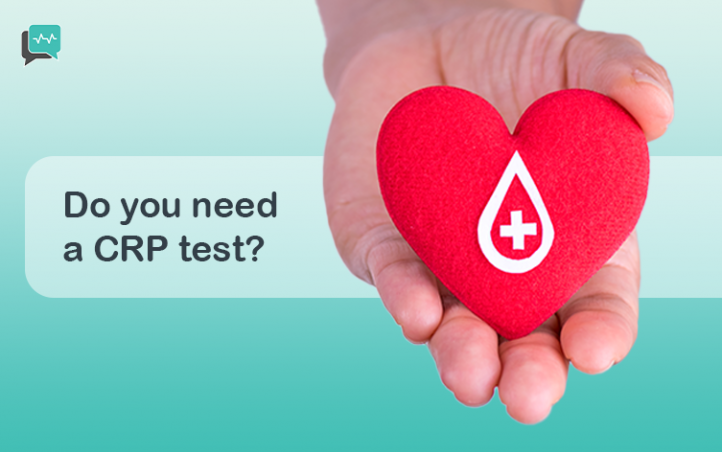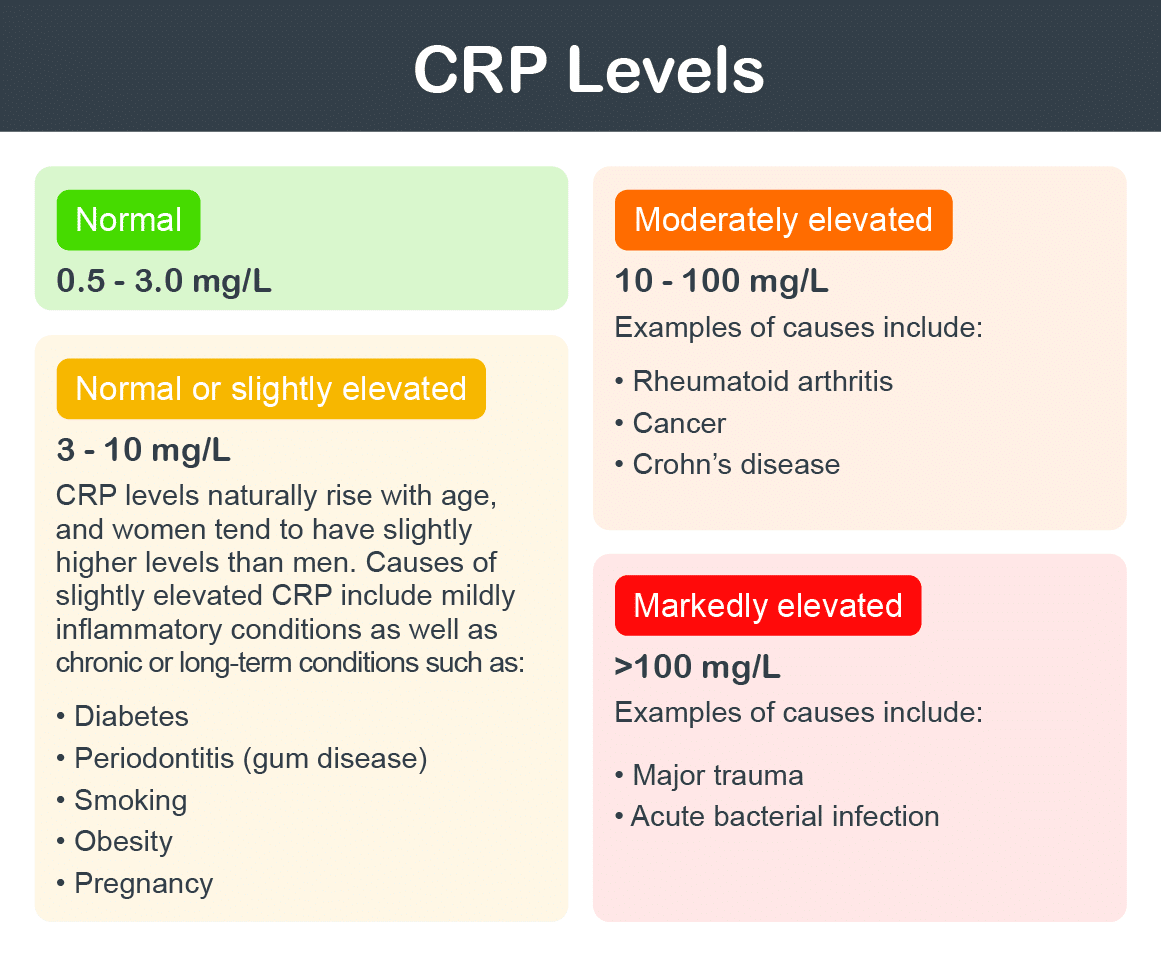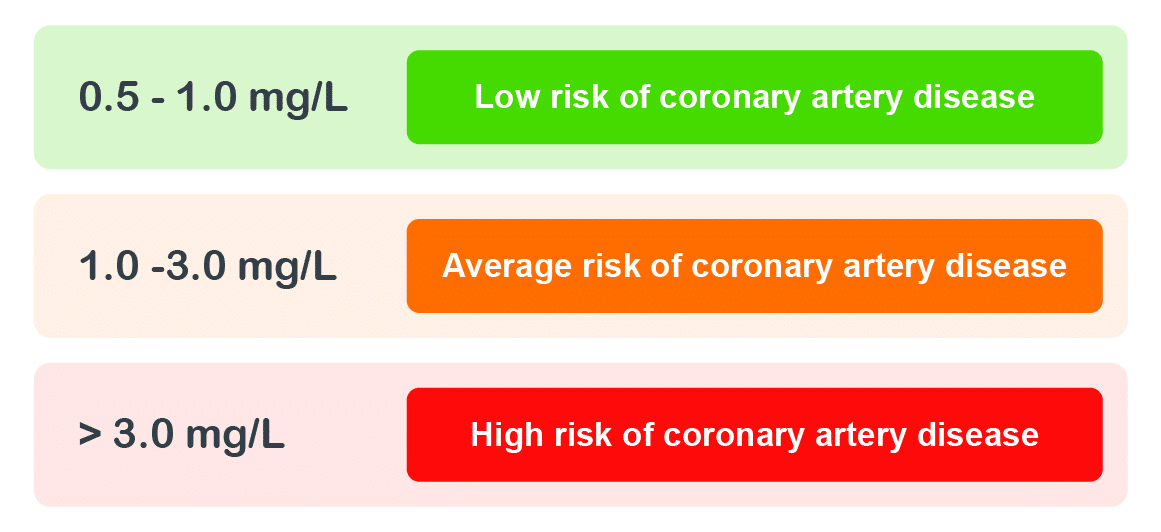C-Reactive Protein

Why have a blood test for CRP?
CRP stands for C-reactive protein, a protein that your body produces when you have inflammation or an infection. CRP circulates in your blood and can be measured with an ordinary blood test. The level of CRP indicates the severity of the inflammation or infection, but not the cause.
Doctors might order a CRP or HS-CRP blood test for the following reasons:
- To evaluate a hospitalized Covid-19 patient’s response to treatment.
- To monitor the severity of an infection
- To help diagnose a chronic inflammatory disease such as lupus or rheumatoid arthritis
- To determine a patient’s risk of a heart attack
- To evaluate a patient’s risk of a subsequent heart attack
A CRP test alone cannot diagnose a specific condition. However, a high result suggests that there is an infectious or inflammatory process occurring in the body. The result must be considered together with a medical history, physical examination and other laboratory or imaging tests.
The HS-CRP test (high sensitivity CRP test) also measures CRP but can measure smaller amounts than the standard CRP test. It may be recommended to evaluate the risk of coronary artery disease in people who are unlikely to have other causes of elevated CRP.
What do the results of a standard CRP test mean?


What do the results of an elevated HS-CRP test mean?

In coronary artery disease (CAD) fat, cholesterol, coronary calcium, and other matter form plaque, a substance which sticks to the inner wall of the arteries that supply the heart. If a piece of plaque breaks off, it can block the heart’s blood supply and cause a heart attack.
Plaque causes chronic low-level inflammation. Therefore, it produces a mild elevation in CRP, less than 10 mg/L. At that low level, if a person does not have other inflammatory or infectious conditions, or known risk factors for coronary artery disease, an HS-CRP test is thought to help predict a person’s risk of coronary artery disease.

An elevated result should be repeated at least 4 weeks later. However, if the result is greater than 10 mg/L, it should be repeated two weeks later in order to rule out an acute infection.
Who should get an HS-CRP test?
There are currently no standard international guidelines for who should have the test, although several medical associations have developed their own guidelines. These guidelines are based on your risk of having a heart attack within the next 10 years.
How do you know your risk of a heart attack within the next 10 years?

Your health care professional can determine your risk. Factors that increase your chances of having a heart attack include:
- Obesity
- Sedentary lifestyle
- History of smoking
- Hypertension (high blood pressure)
- Diabetes
- Older age
- Diet high in saturated fat
- Family history of coronary artery disease
- High total cholesterol or LDL cholesterol
- High triglycerides
Why not have an HS-CRP test along with routine bloodwork even if you don’t have risk factors?
In a person with few risk factors for coronary artery disease, an elevated HS-CRP is reasonably likely to reflect a mild inflammatory condition unrelated to the heart. An elevated result could lead to an unnecessary in-depth cardiac evaluation. However, there is a significant increase in the rate of heart attacks in people at the low end of an elevated HS-CRP versus people at the higher end of an elevated HS-CRP. As studies help us to better interpret the HS-CRP test, health care providers might eventually routinely recommend the test even to people at low risk.

People at high risk should probably take prescribed medication and make lifestyle changes, regardless of their exact HS-CRP level. Therefore, many health care providers feel the test is unnecessary.
The HS-CRP test may be most useful to people in otherwise good health who are at intermediate risk of having a heart attack in the next 10 years. Based on the result, they can decide how aggressively to try to modify their risk factors with lifestyle changes or medicine.
Can anything interfere with my test results?
- A recent injury or illness, or a current mild illness can increase CRP. If you are having the test to determine your risk of coronary artery disease, you should wait until you are fully recovered.
- Hormone replacement therapy can increase CRP.
- Recent strenuous exercise can cause a brief increase in CRP.
- Some medications can falsely lower the CRP test result. Examples include magnesium supplements, statins, and non-steroidal anti-inflammatory drugs (NSAIDS).
Be aware that laboratory reference ranges can vary. Your lab might categorize the values differently.
Is CRP a useful measurement of severity in Covid-19?

Many hospitals test CRP levels in patients with Covid-19 daily. CRP rises or falls very soon after inflammation increases or decreases. Therefore, the CRP level provides the medical team with almost real-time information about a hospitalized patient’s condition and their response to treatment.
High CRP levels, or CRP levels that are not dropping despite hospital care, are among several indicators that the patient might need to be admitted to the intensive care unit or be placed on mechanical ventilation.
CRP sounds like a vague test. How do I know my doctor is interpreting it correctly?
Since an elevated CRP is a non-specific indicator of many different conditions, the health care provider has to use their knowledge and experience in narrowing down the possibilities and deciding the next steps to take. Their interpretation of the test will be based on the results of any other medical tests and treatments you’ve had, a physical exam, and perhaps most importantly, the information you provide about your symptoms and your medical history. Be as accurate and complete as you can.
With the increasing use of the HS-CRP test to predict cardiac disease risk and the newer use of CRP to guide treatment decisions in hospitalized Covid-19 patients, both in addition to the longstanding use in detecting inflammation, CRP and HS-CRP are likely to become tests that we are all familiar with.
How Halza can help?
Manage your family’s health easily with the Halza app. Store, track & share all of your child’s medical records to have them with you, wherever you go. Monitor your child’s growth and vaccination schedule as well as upload reports and doctor’s notes all with the Halza app. QuickShare a complete overview of you or your child’s health with any attending doctor in seconds, during emergencies or whenever you need.
Simplify your health journey with Halza.